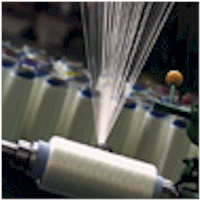|
acrylic
carpet fiber
 Acrylic
Carpet Fiber Acrylic
Carpet Fiber
Acrylic carpet fiber offers the appearance and feel of wool without the
cost. Acrylic carpet fiber has a low static level and is
moisture and mildew resistant. It is commonly used in Velvet and Level Loop
constructions, it is often used for bath and scatter rugs.
Acrylic carpet fiber is known as art, art wool, or man-made wool because it is an
artificial fiber. These fibers provide the look and feel of wool at a fraction of the
cost. Acrylic carpet fiber resists static electricity, moisture, mildew, fading, crushing,
staining, and sun damage. However, acrylic fiber is not durable enough for high
traffic areas (it fails under abrasion when compared to other fibers).
Acrylic fibers are produced from acrylonitrile, a petrochemical. The acrylonitrile is
usually combined with small amounts of other chemicals to improve the ability of
the resulting fiber to absorb dyes. Some acrylic fibers are dry spun and others are
wet spun. Acrylic fibers are used in staple or tow form. For a detailed
production flowchart (wet and dry spun), go here.
These fibers are modified to give special properties best suited for
particular end-uses. They are unique among synthetic fibers because they have an
uneven surface, even when extruded from a round-hole spinneret.
Acrylic Carpet Fiber Characteristics:
• Outstanding wickability & quick drying to move moisture from body surface
• Flexible aesthetics for wool-like, cotton-like, or blended appearance
• Easily washed, retains shape
• Resistant to moths, oil, and chemicals
• Dyeable to bright shades with excellent fastness
• Superior resistance to sunlight degradation
Fibers:
nylon
|
olefin
|
polyester
|
wool
See Also:
branded
|
blended
|
yarn
economics |
yarn
processing
©2010 FloorBiz, Inc. All Rights Reserved
Flooring |
Flooring Guide |
Flooring Info |
Flooring Forum
| |
 Acrylic
Carpet Fiber
Acrylic
Carpet Fiber